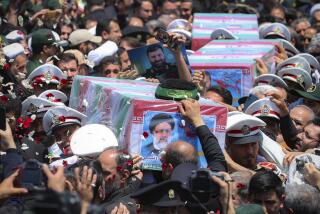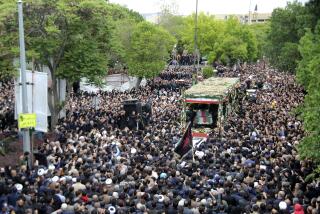Clerics Lament Sectarian Deaths
- Share via
BAGHDAD — A day after a suicide bomber killed 35 people near a revered Shiite Muslim shrine, clerics across Iraq on Friday called for an end to the sectarian killing that one imam described as “waking every day to the view of blood.”
The bombing near the Imam Ali Mosque in Najaf on Thursday ignited fresh sectarian passions that lingered over sermons in Shiite and Sunni mosques. Some Muslim clerics wondered whether Iraq had slipped too far, becoming a nation where the sounds of weeping mothers and praying imams were lost in the din of kidnappings, explosions and slaughter.
“We lost all our feelings. We are saying goodbye to our sons every day,” Khaled Hassnawi, a Sunni imam, said in his sermon at the Abdul Qadir Gilani Mosque in Baghdad. “Wherever you go, you see the blood of Muslims being shed. When will this time pass? When will those playing with this fate be satisfied?”
Speaking at the largest Shiite mosque in Baghdad, Imam Sayed Nayil Musawi said: “These adversities that you are seeing every day is like training for us. God is testing our patience.... The incident in Najaf -- who was killed? Poor people in the market. More than 30 were martyred. Najaf’s sacredness was violated by this attack.”
But even on a day of prayer, violence continued across the country. The bodies of six blindfolded men bearing signs of torture were found around the capital. An Iraqi police convoy hit a roadside bomb near the northern city of Kirkuk, killing two policemen and injuring three.
Gunmen in southern Iraq ransacked two offices belonging to President Jalal Talabani’s political party, the Patriotic Union of Kurdistan, or PUK. The attacks in the cities of Kut and Karbala followed a PUK newspaper story charging that a top Shiite cleric, Ayatollah Mohammed Yaqoubi, had inflamed sectarian tension between Shiites and Sunni Kurds in Kirkuk. One security guard was injured.
The U.S. military announced that the bodies of two servicemen were recovered from the wreckage of their helicopter, which crashed Tuesday in the Sunni insurgent stronghold of Al Anbar province. The military said the crash was not the result of hostile fire.
Prime Minister Nouri Maliki’s government has blamed the Najaf bombing on attempts by Sunni insurgents and Saddam Hussein loyalists to prevent reconciliation between Shiites and Sunnis. The government in recent weeks has been unable to stem sectarian killings, even as U.S. and Iraqi soldiers have stepped up raids in Baghdad and other cities to shut down militias and death squads.
Many Shiite leaders have lost faith in the Iraqi army and police and are calling for more reliance on neighborhood defense committees and militias -- including anti-U.S. cleric Muqtada Sadr’s Al Mahdi army. In several sermons Friday, Sunni and Shiite imams criticized the Iraqi government and the American forces.
In a statement released by his office, Sadr said that if government officials did not swiftly end the U.S. occupation, he would “disavow them until Judgment Day.”
Musawi said: “When the government is able to protect the country and its people, then we will have no need for the militias. The government is not able to protect its own officials; that is why they are staying in the Green Zone. They should let us protect ourselves.”
Imam Mohammed Ahmad Fallouji told his Sunni followers at the Raqeeb Mosque in Fallouja: “These sectarian acts bring nothing to the country but disaster and bloodshed. Such acts serve but the American and foreign plans that aim to render Iraq into a weak and divided country suffering from hostilities. Things will continue to deteriorate as long as the occupier exists on our land.”
*
Special correspondents in Baghdad, Fallouja, Najaf and Kirkuk contributed to this report.
More to Read
Sign up for Essential California
The most important California stories and recommendations in your inbox every morning.
You may occasionally receive promotional content from the Los Angeles Times.














